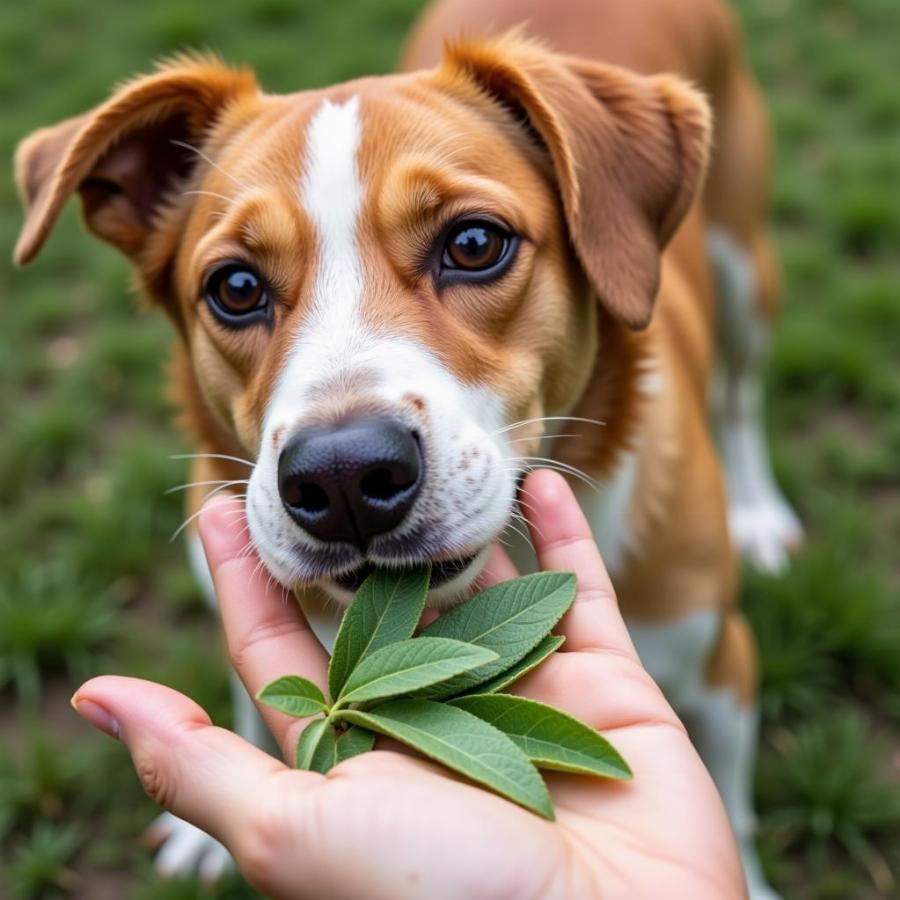Sage, a common culinary herb, is known for its distinct aroma and flavor. It’s often found in our kitchens, gracing dishes from Thanksgiving turkey to savory sauces. But what about our furry friends? Can dogs have sage? That’s the question many dog owners ponder, and we’re here to provide a comprehensive answer.
Understanding Sage and Its Potential Effects on Dogs
While small amounts of common sage (Salvia officinalis) are generally considered safe for dogs, it’s crucial to understand the nuances of this herb and its potential impact on canine health. Sage contains essential oils, including thujone, which can be toxic in large quantities. Therefore, moderation is key. Offering a small sprinkle of fresh sage as an occasional treat is unlikely to cause harm, but allowing your dog to consume large amounts, particularly concentrated forms like essential oils, can lead to adverse effects.
 Dog Sniffing Sage Leaves
Dog Sniffing Sage Leaves
Is Sage Toxic to Dogs? The Importance of Dosage
The toxicity of sage in dogs depends primarily on the dosage. While small amounts are generally safe, large quantities can cause digestive upset, including vomiting and diarrhea. In extreme cases, excessive consumption of thujone-containing plants like sage can lead to neurological problems such as tremors and seizures. It’s always best to err on the side of caution and consult with your veterinarian before adding any new herbs, including sage, to your dog’s diet.
The Benefits and Risks of Sage for Dogs
While sage isn’t a necessary part of a dog’s diet, some believe it offers potential health benefits, such as antioxidant and anti-inflammatory properties. However, scientific evidence supporting these claims in dogs is limited. Moreover, the potential risks associated with excessive sage consumption outweigh any potential, unproven benefits. Therefore, it’s not recommended to use sage as a regular supplement for your dog.
What to Do If Your Dog Eats Sage
If your dog accidentally ingests a small amount of sage, there’s usually no cause for alarm. Monitor them for any unusual symptoms like vomiting, diarrhea, or lethargy. If your dog consumes a large amount of sage, especially in concentrated form like essential oil, contact your veterinarian immediately. They can provide guidance and recommend appropriate treatment based on your dog’s size, breed, and the amount of sage ingested.
Safe Herbs for Dogs: Alternatives to Sage
While sage should be given sparingly, several other herbs are considered safe and potentially beneficial for dogs. These include parsley, ginger, and rosemary. Parsley can act as a breath freshener, ginger can aid digestion, and rosemary possesses antioxidant properties. However, even with safe herbs, moderation is essential. Always consult with your veterinarian before introducing any new herbs to your dog’s diet. They can help you determine the appropriate dosage and ensure the herb doesn’t interact with any existing medications your dog may be taking. heartworm medicines for dogs are crucial for your dog’s health, and it’s essential to ensure any herbal additions don’t interfere with their effectiveness.
Can Dogs Have Sage in Cooked Food?
Small amounts of sage incorporated into cooked food are generally not harmful to dogs. However, avoid feeding your dog dishes heavily seasoned with sage or other herbs and spices. Many seasonings, including salt and garlic, can be toxic to dogs. are egg shells good for dogs? They can be, in moderation, but always prioritize a balanced diet formulated for your dog’s specific needs.
Conclusion: Sage and Your Canine Companion
While a sprinkle of sage won’t likely harm your dog, it’s best to avoid giving it regularly. There are many other safer and more beneficial treats you can offer your furry friend. Always prioritize your dog’s health and well-being by consulting with your veterinarian before introducing any new foods or supplements to their diet. Remember, a balanced diet and regular veterinary care are crucial for a happy and healthy canine companion. do australian sheep dogs shed? If you’re considering adding a furry friend to your family, understanding their shedding habits is important. Also, be aware of potential dangers around your home and display appropriate signage, like a beware of dogs sign, to ensure the safety of both your pet and visitors.
FAQ:
- What are the signs of sage poisoning in dogs? Vomiting, diarrhea, tremors, and seizures.
- Can dogs have sage essential oil? No, sage essential oil is highly concentrated and can be toxic to dogs.
- Are there any benefits to giving dogs sage? Potential benefits are unsubstantiated and the risks outweigh any perceived advantages.
- What herbs are safe for dogs? Parsley, ginger, and rosemary, in moderation.
- What should I do if my dog eats a lot of sage? Contact your veterinarian immediately.
More Questions?
Do you have other dog-related health concerns, such as understanding alp elevation in dogs? Explore our website for a wealth of information to help you care for your canine companion.
Beaut Dogs is your go-to resource for all things dog-related. We provide reliable and comprehensive information to help you understand and care for your furry friend. When you need support, contact us by Email: [email protected] so that Beaut Dogs can answer in detail and accurately. Visit Beaut Dogs today at https://beautdogs.com!